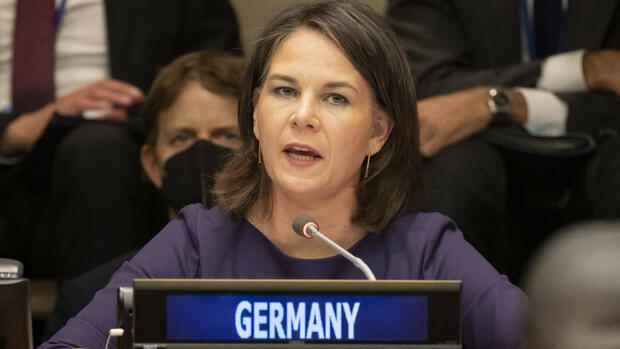In the next four weeks, New York will be dealing with a question that could decide the security of the world’s population in an emergency: How can the use of nuclear weapons be prevented in the future?
Foreign Minister Annalena Baerbock (Greens) traveled to the Review Conference of the Non-Proliferation Treaty (NPT) with great idealism. As she emphasized before leaving, she is still concerned with the “deployment for nuclear disarmament”.
But as great as the idealism is, the Foreign Minister’s expectations of actually being able to achieve something substantial in New York are low. If you only make “one millimeter” progress at the conference, according to Baerbock, it is “worth every effort”.
The foreign minister’s open pessimism seems justified in view of the current world situation. In April, Chancellor Olaf Scholz (SPD) warned against a third world war and added: “There must be no nuclear war”.
Above all, the Russian war of aggression in Ukraine and the repeated implicit threat by Moscow to use its own nuclear arsenal are causing concern. UN Secretary-General António Guterres warns: “The prospect of a nuclear conflict that was once unthinkable is now once again within the realm of possibility.”
>> Read here how serious the nuclear threat from Russia is
For the Green politician Baerbock, the answer to the global nuclear threat is clear: the unconditional demand for disarmament. She had made that clear before the start of the Russian war of aggression.
The traffic light had declared nuclear disarmament to be one of its main foreign policy concerns. Even now you have to be “stubborn” on this topic, Baerbock demanded.
At the same time, however, there are more and more voices that rely on the deterrent effect of nuclear weapons, precisely because of the current geopolitical world situation. The calculation here: As long as both sides of a conflict possess nuclear weapons, neither side will make the decision to use them.
Arguments against disarmament
In game theory, this state is referred to as the “balance of terror” – a term used to describe the relationship between the US and the Soviet Union, particularly during the Cold War. It is considered an argument against the unconditional nuclear disarmament demanded by Foreign Minister Baerbock.
“Unfortunately, unilateral disarmament steps by the West do not help,” said the foreign policy spokesman for the Union faction in the Bundestag, Jürgen Hardt, the Handelsblatt. “As long as Russia, China or Iran are working offensively on their nuclear weapons program, deterrence remains essential.”
As an example, Hardt cites the fact that Ukraine gave up nuclear weapons in the 1990s and has now been attacked. “The Russian war of aggression has pushed the goal of a nuclear-weapon-free world a long way off,” says Hardt.
The danger of nuclear war is once again in the air.
(Photo: dpa)
The opinion of the German population about nuclear weapons also seems to have changed a bit with the Russian war of aggression: According to a survey by the opinion research institute infratest-dimap in June, 52 percent of Germans were in favor of American nuclear weapons remaining on German soil.
According to the Munich Security Conference, in 2021 only 14 percent supported the bombs’ whereabouts. An estimated 20 US nuclear bombs are currently stored at Büchel Air Base in Rhineland-Palatinate.
The USA is one of the five states that have the right to possess nuclear weapons according to the NPT: in addition to the USA, these are also France, China, Great Britain and Russia.
Over 90 percent of the nearly 15,000 officially registered guns are currently owned by the US and Russia. However, other states such as Iran, Pakistan and North Korea are also suspected of having nuclear weapons or working on their production.
Relaunch of the Iran deal is on the brink
In the case of Iran, it seems to be hanging in the balance as to whether the Persian country’s international nuclear deal with China, Germany, France, Great Britain, Russia and the USA can be revived. During his tenure in office, US ex-President Donald Trump withdrew from the agreement that had been in force since 2015, which provided for a restriction of Iran’s nuclear program in exchange for the easing of Western sanctions.
On Monday, however, spokesman for the foreign office in Tehran, Nasser Kanaani, announced that Iran had received “important messages” about the renewal of the agreement. There would be “soon the possibility for new negotiations”.
The time window in which a new edition of the agreement could be realistic is very small. The midterm elections will be held in the United States in November. If, as expected, the Republicans get the majority there, the domestic political situation in the USA would probably prevent a new agreement with Iran.
In June, the International Atomic Energy Agency (IAEA) warned that Iran was only weeks away from producing enough radioactive source material to build a nuclear bomb. At the same time, Iran once committed itself to disarmament and signed the Nuclear Non-Proliferation Treaty.
More: Baerbock in Turkey: between the rule of law and realpolitik
